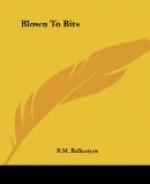Nigel shut up the telescope through which he had been examining the thin, blue line on the horizon that indicated the islands in question, and sat down on the cabin skylight beside his father.
“They’ve got a romantic history too, though a short one, an’ are set like a gem on the bosom of the deep blue sea—”
“Come, father, you’re drifting out of your true course—that’s poetical!”
“I know it, lad, but I’m only quotin’ your mother. Well, you must know that the Keelin’ Islands—we call them Keelin’ for short—were uninhabited between fifty and sixty years ago, when a Scotsman named Ross, thinking them well situated as a port of call for the repair and provisioning of vessels on their way to Australia and China, set his heart on them and quietly took possession in the name of England. Then he went home to fetch his wife and family of six children, intendin’ to settle on the islands for good. Returning in 1827 with the family and fourteen adventurers, twelve of whom were English, one a Portugee and one a Javanee, he found to his disgust that an Englishman named Hare had stepped in before him and taken possession. This Hare was a very bad fellow; a rich man who wanted to live like a Rajah, with lots o’ native wives and retainers, an’ be a sort of independent prince. Of course he was on bad terms at once with Ross, who, finding that things were going badly, felt that it would be unfair to hold his people to the agreement which was made when he thought the whole group was his own, so he offered to release them. They all, except two men and one woman, accepted the release and went off in a gun-boat that chanced to touch there at the time. For a good while Hare and his rival lived there—the one tryin’ to get the Dutch, the other to induce the English Government to claim possession. Neither Dutch nor English would do so at first, but the English did it at long-last—in 1878—and annexed the islands to the Government of Ceylon.
“Long before that date, however—before 1836—Hare left and went to Singapore, where he died, leaving Ross in possession—the ’King of the Cocos Islands’ as he came to be called. In a few years—chiefly through the energy of Ross’s eldest son, to whom he soon gave up the management of affairs—the Group became a prosperous settlement. Its ships traded in cocoa-nuts (the chief produce of the islands) throughout all the Straits Settlements, and boat-buildin’ became one of their most important industries. But there was one thing that prevented it from bein’ a very happy though prosperous place, an’ that was the coolies who had been hired in Java, for the only men that could be got there at first were criminals who had served their time in the chain-gangs of Batavia. As these men were fit for anything—from pitch-and-toss to murder—and soon outnumbered the colonists, the place was kept in constant alarm and watchfulness. For, as I dare say you know, the Malays are sometimes liable to have the spirit of amok on them, which leads them to care for and fear nothin’, and to go in for a fight-to-death, from which we get our sayin’—run amuck. An’ when a strong fellow is goin’ about loose in this state o’ mind, it’s about as bad as havin’ a tiger prowlin’ in one’s garden.”




